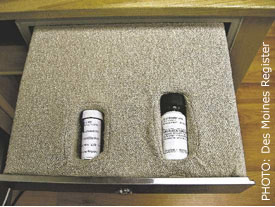Concerned that women’s health will be put at risk if the controversial practice of telemed abortions comes to Arizona, the state House today voted to ensure that medical abortions must also have a physician’s oversight.
 Current state law requires that licensed physicians must perform any surgical abortions and the state House today extended that statute to apply to abortions involving the dangerous RU 486 abortion drug. That’s the pill that has already killed at least a dozen women worldwide and injured more than 1,100 women in the United States, according to 2006 figures from the FDA.
Current state law requires that licensed physicians must perform any surgical abortions and the state House today extended that statute to apply to abortions involving the dangerous RU 486 abortion drug. That’s the pill that has already killed at least a dozen women worldwide and injured more than 1,100 women in the United States, according to 2006 figures from the FDA.
The vote is a reaction to the new practice in the state of Iowa that Planned Parenthood employees called telemed or webcam abortions. The process has abortion practitioners instruct women on using the dangerous abortion drug by video conference instead of assisting them in person. Abortion rates nationally have dropped, as have the number of surgical abortion clinics. However, in Iowa, abortion rates have remained steady as telemed abortions have offset the decrease in the number of surgical abortions.
There is also concern that not having a doctor present will hurt women since the mifepristone (RU 486) abortion drug is only supposed to be taken around seven weeks into pregnancy and can’t be used in cases where an ectopic pregnancy is present because it could pose life-threatening problems for women. A physician’s examination and determining the age of the unborn child are advised by the FDA before the abortion drug is used.
That’s why Rep. Kimberly Yee, a Republican from Phoenix, said the bill to ensure the doctor visit is necessary.
“Medication abortions have very serious complications and are not a safer alternative to surgical abortions,” she said, according to the East Valley Tribune.
Yee’s bill, HB 2416, also requires doctors to perform an ultrasound and detect the heartbeat of the unborn child at least an hour before the administration of the first of the two-part abortion drug and women are given an opportunity to view both the ultrasound and the fetal heartbeat.
Bryan Howard, president of Planned Parenthood, told the newspaper the abortion business opposes the bill to help women and said the net effect of the measure would be fewer abortions. He also claimed it would make accessing abortion in rural areas more difficult.
The president of the Planned Parenthood abortion business previously indicated telemed abortions would become a national phenomenon.
The Tribune also indicated the state House signed off on a bill, HB 2384, that would change state law to deny tax credits for charities that do abortions or refer women for abortions.
That’s a response to a December 2010 report LifeNews.com issued revealing Planned Parenthood Arizona is promoting tax credits intended for organizations that assist poor state residents for donations that would benefit the abortion business. In a promotional, the southwestern abortion organization issued a fundraising appeal taking advantage of a federal tax rebate.
“Your generous donation can be applied to the Arizona Working Poor Tax Credit,” it says. “What this means to you is that, in addition to a federal tax deduction, if you itemize your deductions and you contribute to Planned Parenthood in Arizona, you may be eligible for a dollar-for dollar state tax credit.”
The tax credit, the abortion business says, can return “up to $200 for an individual filer and up to $400 for a married couple filing jointly.”
According to the Arizona Department of Revenue, the tax credit is designed “for contributions that provide assistance to the working poor.”







